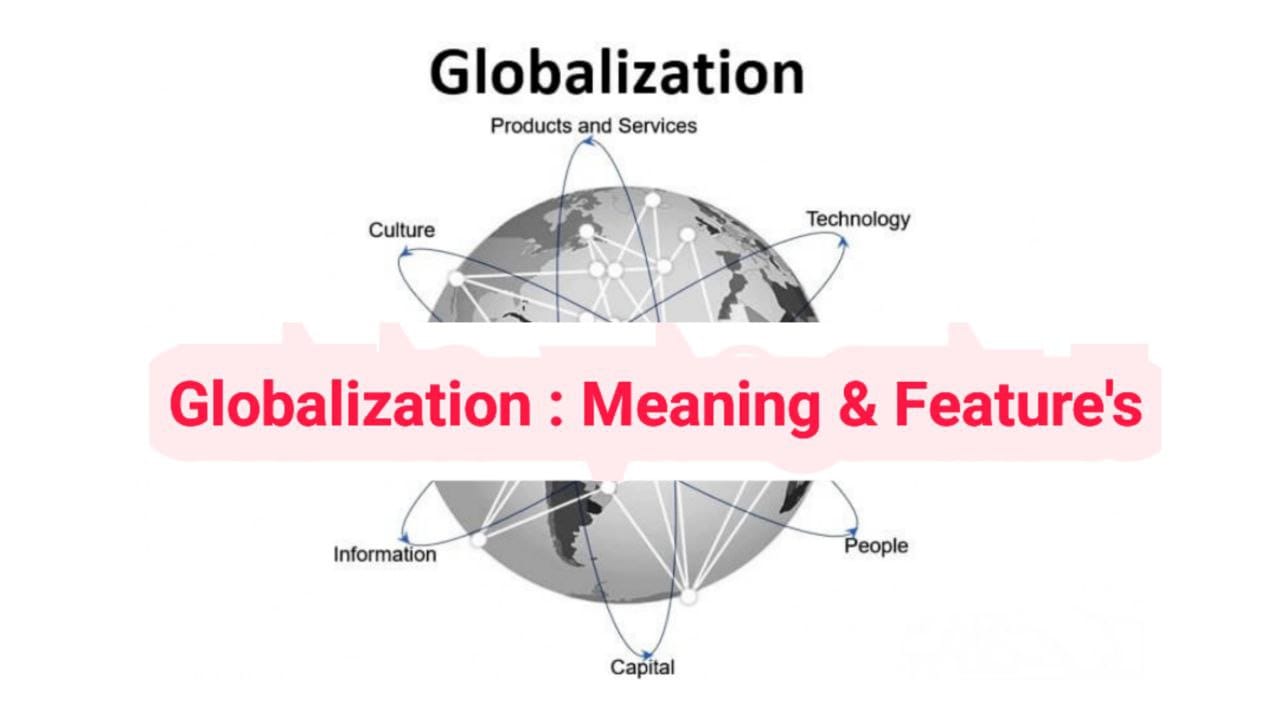Definition of Globalization
Globalization refers to the process of increasing interdependence and integration among countries, economies, cultures, and societies. This process is driven by advancements in communication, transportation, and technology, enabling the flow of goods, services, capital, information, and people across borders. Globalization connects the world in a way that enhances trade, cultural exchange, and global cooperation, while also fostering competition and cross-border investments.

Features of Globalization
- Global Trade Expansion:
- Trade across national borders is a core feature of globalization. Countries import and export goods and services more freely, benefiting from specialized production and competitive pricing.
- Free trade agreements (FTAs) and reduced trade barriers have increased international commerce and market access.
- Technological Advancements:
- Rapid developments in information and communication technologies (ICT), such as the internet, smartphones, and social media, have made it easier to communicate and share information globally.
- Transportation technologies, like air travel and shipping, have also improved, making the movement of goods and people faster and more cost-effective.
- International Capital Flows:
- Globalization facilitates the movement of capital across borders, including foreign direct investment (FDI), portfolio investments, and remittances.
- Investors and businesses can access global financial markets, enabling companies to operate and invest in multiple countries.
- Global Supply Chains:
- Businesses source materials, components, and services from multiple countries to optimize production and reduce costs. This has led to the creation of global supply chains, where different stages of production are spread across various nations.
- This interdependence between countries ensures that products are often “made in the world,” with parts and processes originating from diverse regions.
- Cultural Exchange:
- Globalization promotes cultural interaction and exchange, allowing different societies to share and adopt elements of language, art, food, music, and lifestyles.
- Cultural products such as movies, television shows, music, and fashion trends are spread globally, influencing people’s tastes and preferences.
- Multinational Corporations (MNCs):
- Large multinational corporations (MNCs) operate in multiple countries, producing and selling goods and services on a global scale. They play a major role in driving economic globalization.
- These corporations often influence local economies, cultures, and even policies, as they adapt their operations to different regional markets.
- Labor Mobility:
- Globalization has enabled people to move across borders in search of better employment opportunities. Migration patterns have become more dynamic as workers relocate to other countries for jobs or education.
- Skilled and unskilled labor may migrate globally, filling gaps in labor markets and contributing to global economic growth.
- Global Institutions and Agreements:
- Institutions like the World Trade Organization (WTO), International Monetary Fund (IMF), and World Bank play crucial roles in facilitating and regulating international trade, finance, and economic cooperation.
- Trade agreements and international treaties further encourage economic integration by reducing trade barriers and promoting cooperation.
- Spread of Knowledge and Innovation:
- Ideas and knowledge are exchanged more easily on a global scale. Researchers, academics, and businesses collaborate across borders, accelerating technological advancements, scientific breakthroughs, and the development of new products.
- This global knowledge exchange drives innovation in industries like healthcare, information technology, and energy.
- Environmental Impact:
- Globalization has significant environmental consequences, as increased industrialization and global trade contribute to pollution, deforestation, and resource depletion.
- Global cooperation is needed to address issues like climate change and environmental sustainability, often leading to international agreements such as the Paris Agreement on climate action.
- Economic Interdependence:
- Nations become more economically dependent on each other as a result of globalization. Economic issues in one country or region, such as financial crises, can have ripple effects across the global economy.
- Countries often coordinate policies and cooperate to mitigate global economic challenges, such as during the 2008 financial crisis.
Conclusion
Globalization is a complex and dynamic process that influences various aspects of society, economy, culture, and politics. While it offers significant opportunities for growth and development, it also presents challenges, such as inequality, cultural homogenization, and environmental concerns.

